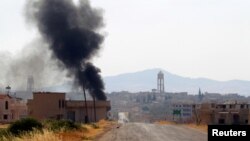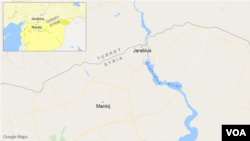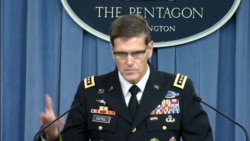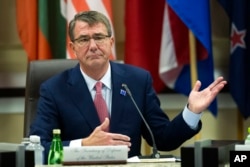Turkey on Wednesday denied U.S. claims that it agreed to a ceasefire with Kurdish fighters and says it will not stop its military offensive in northern Syria until all threats are removed.
The U.S. asked Turkey to halt its offensive against the Kurds and instead focus its efforts on combating the Islamic State group, but a spokesman for Turkey's President Recep Tayyip Erdogan called a truce "out of the question."
"They will remain our target unless they retreat east of the Euphrates," he said.
While Turkey denied it had entered into a ceasefire with the Kurds, Wednesday marked the third day with no reports of fighting between the two sides, suggesting that both the U.S. allies had heeded its calls for peace, at least for the time being.
Turkey launched the offensive last week targeting Islamic State militants as well as U.S.-backed Kurdish fighters that the Turkish government considers linked to Kurdistan Workers' Party rebels at home.
Clashes between the Turks and Kurds have further complicated an already complex situation in Syria where the government has received support from Iran, Russia and Lebanon-based Hezbollah militants while the U.S. and other western powers backed rebel fighters.
"Until terrorist groups and threats against our borders and citizens are removed our operation will continue," Turkey's Prime Minister Binali Yildrim told reporters.
Syrian sovereignty
Earlier Wednesday, Iran called for a quick end to Turkey's military offensive in northern Syria, saying the continued presence of Turkish forces will only escalate the conflict.
Iranian foreign ministry spokesman Bahram Ghasemi called Turkey's move a violation of ally Syria's territorial sovereignty, echoing comments the Syrian foreign ministry made last week.
The Turkish offensive succeeded in pushing Islamic State out of the town of Jarablus before skirmishing further to the south with Kurds who had themselves helped retake control of Manbij.
A top U.S. general said Tuesday the Kurds had crossed back over to the eastern side of the Euphrates River, away from Manbij, in a move the U.S. hopes will put an end to the clashes.
“The portion of the Kurds that are part of the SDF (Syrian Democratic Forces) are on the east side of the Euphrates River at this time. They have lived up to their commitment to us,” U.S. Army Gen. Joseph Votel, the head of U.S. Central Command that oversees operations in the Middle East, told reporters at the Pentagon Tuesday.
The SDF is primarily made up of Kurdish fighters, but Syrian Arabs, Turkmen and others also are part of the fighting group.
Votel said members of the SDF who have stayed west of the Euphrates to hold ground gained from IS in and around the city of Manbij are not Kurds and are “principally made up of forces that come from that particular area.”
WATCH: US Army General Joseph Votel on Syria
Votel: Turkey, US-allied Kurdish forces 'critical
Votel said both Turkey and U.S.-allied Kurdish forces in Syria are "critical" to the fight against Islamic State forces in the region.
He added that the U.S. relies on both parties to help counter the "principal threat" of IS. "Our support for all parties is contingent upon the focus upon ISIL," he said, using another acronym for the terror group.
The general said that while he has not received any verbal assurances from Turkey that it will remain in Syria to fight the terror group, he has seen actions from Turkey that are “extraordinarily positive,” from moving west along the border of Jarablus to pursue IS, to continuing other partnering efforts against IS along the Mara Line, in Syria’s northwest.
“Deeds matter, and what I’m seeing on the ground is that they remain very committed to the ISIL fight,” Votel said Tuesday.
Carter to Turkey 'stay focused'
His comments came a day after U.S. Defense Secretary Ash Carter called on Turkey to "stay focused" on the fight against Islamic State and not engage with U.S.-allied Kurdish forces also battling the terror group in Syria.
Turkey's EU minister Omer Celik denied Wednesday that there was any kind of cease-fire agreement with the Kurds. On Tuesday, Turkey said U.S. criticism of its operations in northern Syria is "unacceptable."
The clashes support Western concerns that Turkey's military incursion into Syria is intended, in part, to target U.S.-supported Kurdish forces known as the Kurdish People's Protection Units, the YPG militia. The United States has described the YPG as one of its most effective allies in the fight against Islamic State, while Turkey is demanding a YPG retreat from all border territory seized from IS jihadists.
Chris Hannas contributed to this report








